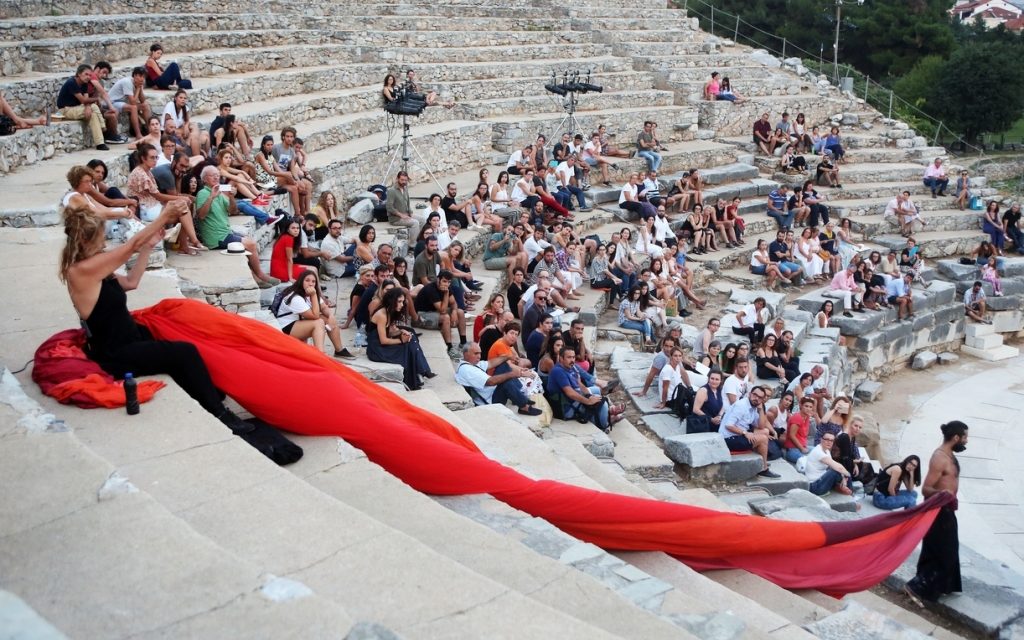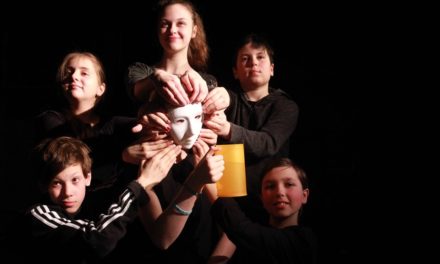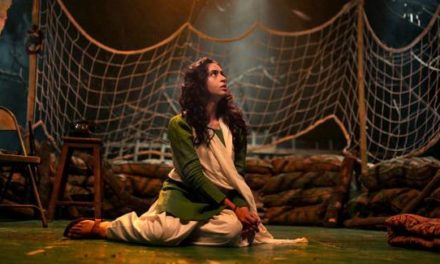Euripides’ Ion – Director: Ioli Andreadi – “Alfa Idea” Theatre – Athens
Staging an ancient Greek tragedy where there is only two characters act is a daring challenge. This is what the young, but quite distinguished for her unique work, the director had to confront when she decided to try this out when she employed a renowned female protagonist and a young award-winning actor. There is also a third factor contributing to the performance, that of a musician who interacts with the two actors with the use of sounds he produces.
The Plot
Euripides tragedy tells the story of Creousa, the queen of Athens, who conceives a child with Apollo but has to abandon it, as she is afraid that nobody would believe her story. The baby boy left to die on the rocks of Acropolis is delivered by Apollo to his temple at Delphi where the priests take the responsibility for bringing him up. When the boy reaches adolescence, named Ion by then, he becomes an attendant at the temple. Years later, Creousa after having been married to Xuthus visits together with him the Oracle of Delphi because they have been unable to have children of their own and seek a sign from the oracles.
Apollo though manages cunningly to persuade Xuthus that Ion is his illegitimate son because he wants to ensure that his son would become the king of Athens, as he is his legal heir and son he had conceived with Creousa, who, ignoring the identity of the young man, would try to kill him. This is because she believes that the person who would be the heir of the throne of Athens is not her own child, has foreign blood and is not a native Athenian as herself. When Ion is saved by chance escaping the killing she has planned, her role would be revealed and the ensuing confrontation between mother and son would disclose who he really is because, on the one hand, Creousa had left specific items in the basket she had placed the baby, and on the other, Apollo would intervene to save his son. The fact that throughout the play tragic moments follow comic ones, has led philologists to classify the play as a marriage of tragedy and comedy.
The performance before New York
Ioli Andreadi having studied in Greece and London and being broadly educated, directed this Euripides’ tragedy that is not often produced. She did not only use her own translation, whose language was flowing, contemporary, and rhythmic, but also a tragedy adaptation for two characters that she wrote together with Aris Asproulis. The first performance was given in the summer of 2017 on the 60th Philippi Festival, then in Athens in the winter of 2017-2018, which was a great success, and finally in the summer of 2018 when it toured the country. It was also chosen to perform in the spring of 2019 in “The Tank” theatre of New York.
The impressive premiere of the performance was given in the Ancient Theatre of Philippi in the natural light of the dusk while Creousa was sitting nobly on the seats among the audience.
Moving the performance in an indoor theatre in Athens (which I attended) did not change the stage design: Creousa, sitting still, lit as a magnificent statue, wrapped in a red cloth and wearing her golden regalia is waiting for the audience seated high on a pedestal in an aisle of the stalls facing the stage. A very impressive image achieved by the set and costume design of Dimitra Liakoura.
On the stage, at a corner the musician Nickos Touliatos surrounded by his musical instruments, some of which are trivial everyday objects such as rubbers, small brooms, or kitchen utensils, creates soundscapes, either by suggesting an atmosphere or imitating the sounds of birds, wings fluttering or flowing waters.
These soundscapes play a significant part, are totally incorporated in the performance, and create the feeling of real exterior spaces.
The acting
Konstantinos Bibis, the celebrated actor, appears on the stage initially in the role of Hermes and then as Ion; he is wearing a long black skirt and has his torso nude because when he plays a different character finger-paints of many colours will be used on it to suggest the change: a red diagonal line on the front part of the body signifying Ion, blue on the shoulders for Xuthus, black paint on the face for the role of the Old Man Servant and others that he erases by himself with a cloth in order to paint himself differently, immersing his fingers inside the stage objects that surround him as if they were libation vessels or tripods of the Delphi temple.
Bibis, changes characters fast, while he employs the conventions colours and different voice intonations convey. He reaches, though, the peak of his performance when he speaks the dialogue between two characters on his own, for example, between two women of the chorus, between Ion and Xuthus and others. We see him changing the colours of the paints on his body, turning or swaying it according to the character he plays, stretching his hands as if dancing, and projecting an energy that captivates the audience. It is a body that creates and recreates the various characters of the play, without reducing the existing intensity. Bibis, giving a brilliant performance, will finally play seven characters in a symbolic quest for the real origins and identity of Ion, while Creousa is watching him.
Dimitra Hatoupi, as Creousa does not participate at the beginning, a presence-absence who in essence is the primary source of all the stage action. She remains still for a long period, but we can discern on her face subtle expressions and fine gestures on her body, even when she starts participating in the dialogue when the vocal fluctuations she uses as an instrument will help her impose herself: an instrument the actress knows how to handle perfectly well, as she uses adeptly all the various intonations, bearing also in mind the acidity that can be created by the tensions or emotions of the characters.
The directing
It is rather difficult for anyone to assume that directing an entire tragedy by using only two actors can capture and hold the audience’s attention. Ioli Andreadi, suggesting the right amount of comic elements through the actors’ intonations and their well-designed movements–justifying as such the doubts whether Ion falls within the genre of a pure tragic plot–directs the play with consistency adhering to an inner harmony. She thus has created by using simple means a brilliant, poetic performance whose main characteristic was a fresh approach to directing a tragedy. At the same time, she also gives a chance to the two actors to excel in their performances.
I can only express an objection: when Creousa enters the stage in the scene she recognizes her son Ion, and the goddess Athena appears, the two actors speak Athena’s lines together, which seems to create an awkward solution that weakens what has happened before. Should she look to find another alternative? The vocal intervention of the musician Nickos Touliatos in this specific scene was really interesting. Could he be given the role of Athena, where he may use the help of his music sounds? This could also allow us to re-interpret his presence in the performance.
Dimitris Tsatsoulis is Professor in Semiotics of Theatre and Performance Theory–University of Patras, Department of Theatre Studies.
Translated from Greek by Anna-Maria Chatzistefanou
This post was written by the author in their personal capacity.The opinions expressed in this article are the author’s own and do not reflect the view of The Theatre Times, their staff or collaborators.
This post was written by Dimitris Tsatsoulis.
The views expressed here belong to the author and do not necessarily reflect our views and opinions.


















